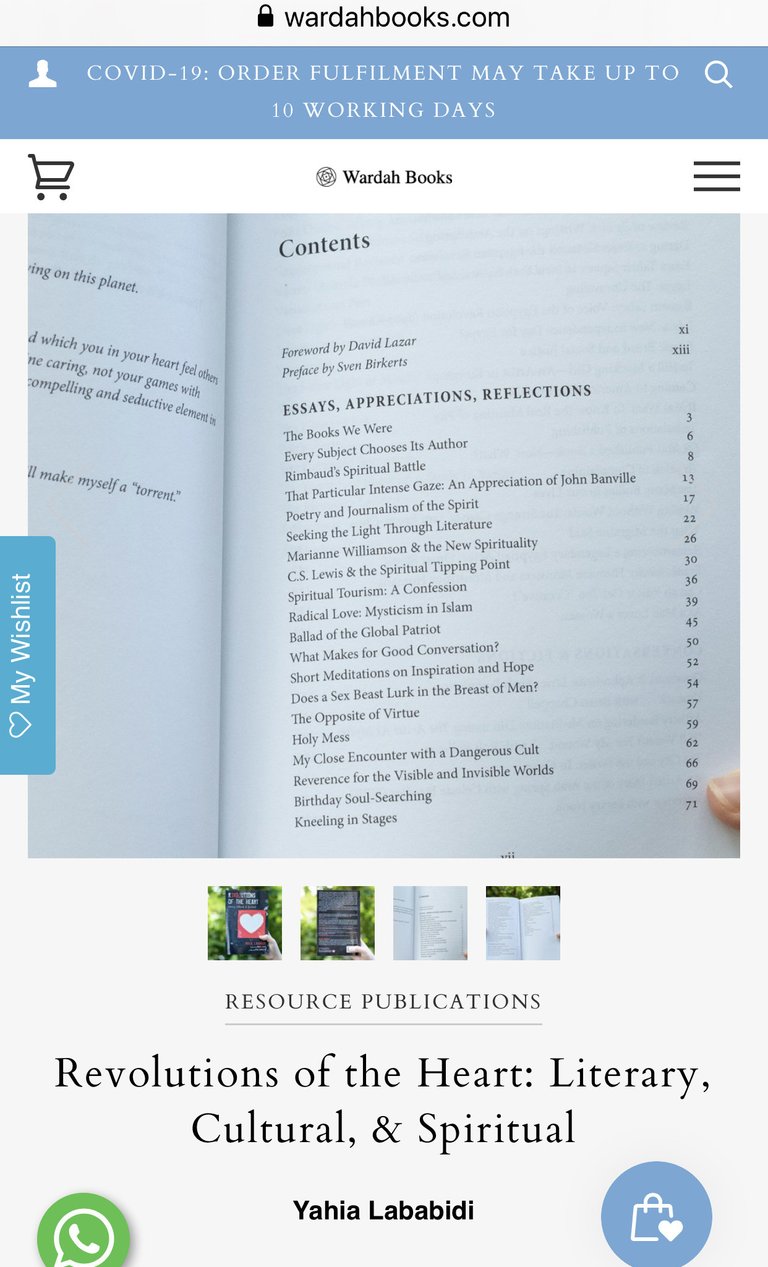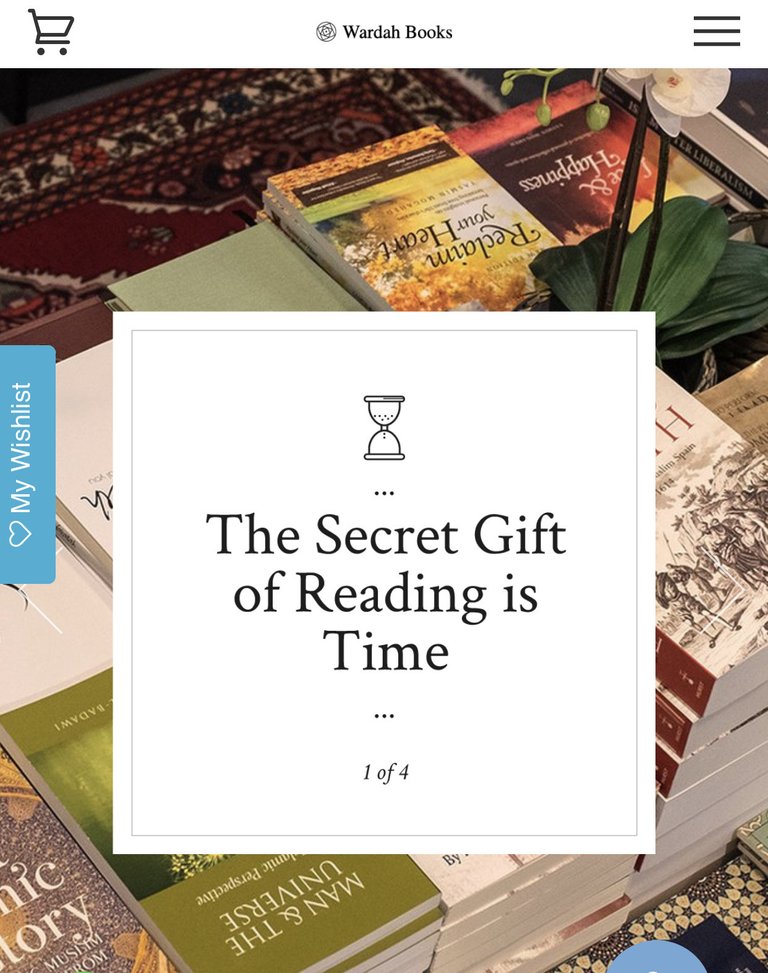
Here’s a transcript of our exchange:
With Ibrahim Tahir
Yahia Lababidi is an Egyptian-American author of poetry, prose, and aphorisms. Lababidi’s new collection of essays and conversations, Revolutions of the Heart is available now, at Wardah Books

Conversation
Taher: There is no avoiding it, we have to speak about the thing that has upended everything and everyone's lives from East to West: the Corona virus. As an artist who primarily works with ideas and words, what has coalesced for you over the last weeks and months?
Lababidi: Fundamentally, we recognise that we need to change... but, we are too weak, forgetful and unsure of where to begin. In my new book, Revolutions of the Heart, I suggest that: "Perhaps crisis is self-induced disaster—a last-ditch effort we gift ourselves to, finally, transform."
We've made so many half-hearted, false starts in the past to change our lives: politically, culturally and spiritually. Maybe, we needed a catastrophe of this magnitude (that we all face, together) to spur us to make another desperate attempt to set our lives in order. As you know, human beings are lazy and forgetful by nature and, who knows, if we were left to our own devices how far we would have continued down the wrong, self-destructive path.
I've been working on a sprawling new poem, Corona Verses (part of which has been published by Oxford University) where I try to make sense of this holy mess we're in and I open it by saying:
“We can’t simply return to how we were after a crisis—
our homes have become cocoons for radical transformation”
My hope is that with this global health crisis, we're crossing a point of no return and must profoundly re-examine our relations with others, ourselves, our planet and the Divine with newfound humility, awareness and tenderness — realising with gratitude, horror and awe that we stood on the precipice of an abyss...
*Certainly. The pandemic is just the latest in a long string of self-inflicted disasters. And it is interesting that you identify the heart as the locus for change (indeed, revolution). I have just finished reading Al-Ghazali's Marvels of the Heart. To paraphrase al-Ghazali, the heart is a multi-modal and multi-valent totality that is at once what we understand as the 'Soul', the 'Spirit', the 'Intellect' and of course, the 'Heart'. Yet this multimodal totality is unitary in essence: something al-Ghazali terms the 'Lataif'.
So yes, a revolution of the heart is in order for there to be real and meaningful change. Moreover, I note the use of the plural in your title, 'Revolutions'. What are you intimating here?*
There is no revolution without evolution and there is no evolution without purification of the heart. Of course, Al-Ghazali is a master class in such matters. Interestingly, the first words I laid eyes on this morning were from a Hadith Bukhari where Prophet Muhammad (ﷺ) says:
“Truly in the body there is a morsel of flesh, which, if it be whole, all the body is whole, and which, if it is diseased, all of [the body] is diseased. Truly, it is the heart.”
So, if we understand that to mean the seat of our soul/spirit/intellect, then we must always be working on cleansing this organ of perception or polishing our mirror, as Rumi puts it.
'The heart is that which, if a man knows it, he knows himself, and if he knows himself, he knows his Lord' says al-Ghazali.
Why Revolutions of the Heart, plural, in my book title? Because, in addition to the spiritual dimension, we also live in a physical realm. To quote al-Ghazali, again, 'the visible world is a trace of the invisible one, and the former follows the latter like a shadow.' Which is to say, in order to see a change in the visible world, we must begin with the invisible.
The Egyptian Revolution, which I discuss at great length in my new book, is an example of an upheaval in the visible realm. As is the attendant re-evaluation of values that precedes cultural revolutions, such as the ones we are experiencing throughout the world, now—where people begin to question the dominant cultural values and seek to live, differently, in accordance with a higher moral imperative.
This is an overriding theme of my new book, the inner and outer (r)evolutions that take place when individuals or nations are on the threshold of change or transformation. If I might be permitted one more al-Ghazali quotation: 'Only that which cannot be lost in a shipwreck is yours.'
What will survive of us after the shipwreck of modernity?

*Historically, great writing survive upheaval, pestilence, ignorance and fear.
So let's turn to your writing, specifically Where Epics Fail. I particularly like the format of the work: three aphorisms on a page, each looking at a slightly different facet of an idea. The format fosters a meditative mode, and the reader, almost despite himself, wanders the corridors of the mind. Time stands still. It is quite a feat actually and to me it underscores how powerful the medium of the book can be.*
Thank you, for this gracious reminder, and all that you do for book culture to ensure their survival. I do believe that, in the same way our souls outlive our bodies, our spirit is somehow encased in our art and, yes, great writing outlasts us.
Who knows where aphorisms come from and where they go... In the past, I've defined them as 'what is worth quoting from the soul's dialogue with itself.' With Where Epics Fail I had been gathering and carrying these aphorisms with me for almost a decade, waiting for the right home/publisher. The placement of three aphorisms per page (which you, kindly, appreciate) was an afterthought, really, when I was getting ready to publish the book: to allow the (sometimes, dense) thoughts space to breathe on the page, and the reader, too.
But, also, because I realised that, looking back at the 800 or so short meditations included in Epics, how I was often revisiting similar territory, circling back over the years to elaborate, clarify or deepen an insight. Which is to say, some aphorisms gravitated towards one another that way, as though drawn by invisible magnets, even though they were conceived years apart, I felt that they belonged to one other.
Strange to say, after publishing this book (around 2 years ago) I have not been writing aphorisms—even though I continued to read them, for edification, such as the pearls of wisdom composed by Ibn 'Ata'llah. But, for whatever reason, lately, I've been focusing on longer prose, such as the essays in Revolutions of the Heart.
That said, during these intense, contemplative last couple of months or so, during the Covid19 lockdown—when it feels like time is standing still—I find that I'm revisiting these brief arts, once more. Here's a peek at moral aphorisms I've been working on:
“To anticipate the worst is to contribute towards its realization.
Our longings shape our future. Pessimism poisons life and then wonders why it chokes.
The precious few times I've peered into my crystal ball, I could make out the letters T.R.U.S.T.
The starved think, differently, than the sated.
Gains obtained, unethically, are short-lived—even if they last a lifetime.
Always act as if you're being watched: where the surveillance state and spiritual state are in agreement.
Our insecurities prevent us from recognizing how dearly we are Beloved.
When we are wrongly accused, the punishment still fits the hidden sin.
Let he who is without sin complain about injustice.
There is no private life; what we do, in secret, is secreted, publicly.
The master and the novice are not permitted the same mistakes.”
*Thank you have sharing these aphorisms. I always appreciate them.
I know an artist who oscillates among different forms: sculpture, painting, poetry, diary entries, translation (yes, I believe translation is a creative act). He does all this because he says that these various expressions inform his main artistic outlet, which is painting. You are comfortable with different forms of literary expression, but which of these is home for you?*
That's a fine question. What a grand and slippery address to pinpoint: Home... As I say in one of the conversations in Revolutions: poetry and essays express different aspects of myself, I suppose. I realise it's not the most wholesome practice to divide oneself thus, but I think my mind is behind the essays, whereas the poetry is more a matter of the heart—meaning, in prose, I pursue analytical and intellectual concerns; whereas, in my poems, I tend to explore more emotional issues.
But, of course, it’s not quite so cut and dry, and not entirely of my choosing, either. I believe in the secret life of ideas and words. By this I mean their mysterious ability to choose how to dress themselves—say, in poetry or prose—before they address the world.
Still, I've not really answered your question. Ultimately, I think aphorisms are home for me, since they express my soul (which is wiser/knows more than the sum of my parts).
*In your new book Revolutions of the Heart, there is an essay titled 'The Hell of Complaining'. Only slightly uncharitably, complaining is considered a national trait here in Singapore. In your essay, I am struck by the juxtaposition of the quote by Idries Shah with that by Reinhold Niebuhr. (Perhaps my mind works in quotations too.) Anyway the essay ends with a long quote by C.S. Lewis. Thank you for that.
I can't listen to complainers, not even a little bit. I tend to leave them be, spiralling down the sinkhole of grumbling and negativity. I find that I greet complainers differently, studiously avoiding my customary, 'How are you?'. For other people, when I ask 'How are you?', I am greeted by that cooling breeze: 'Alhamdulillah'.
So perhaps for my last question, I will end how I should have started.
Dear Yahia, how are you?*
Alhamdulillah.
